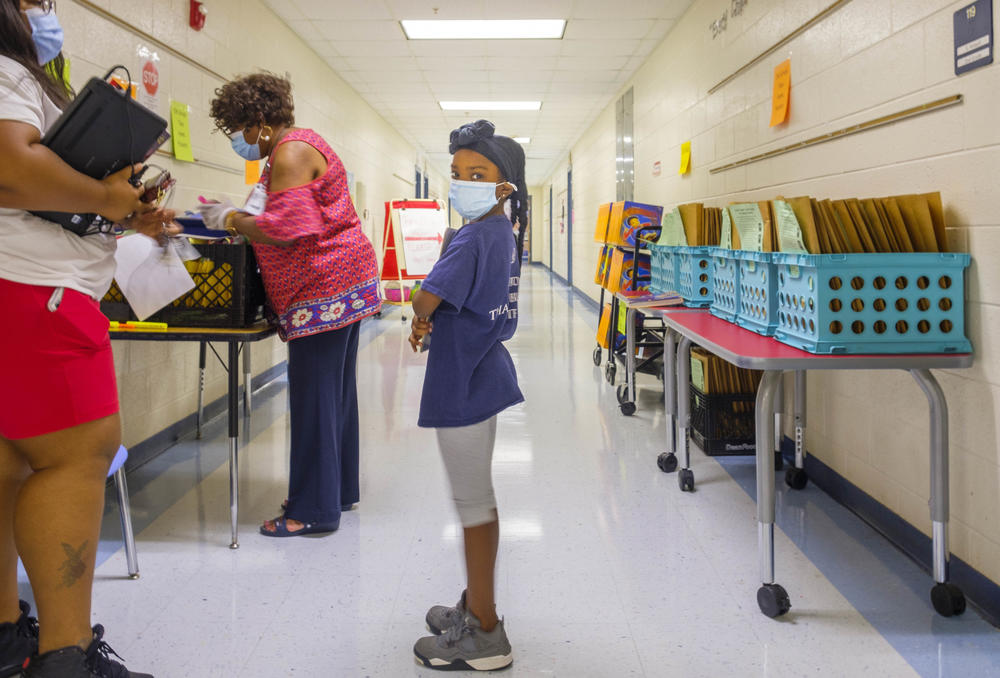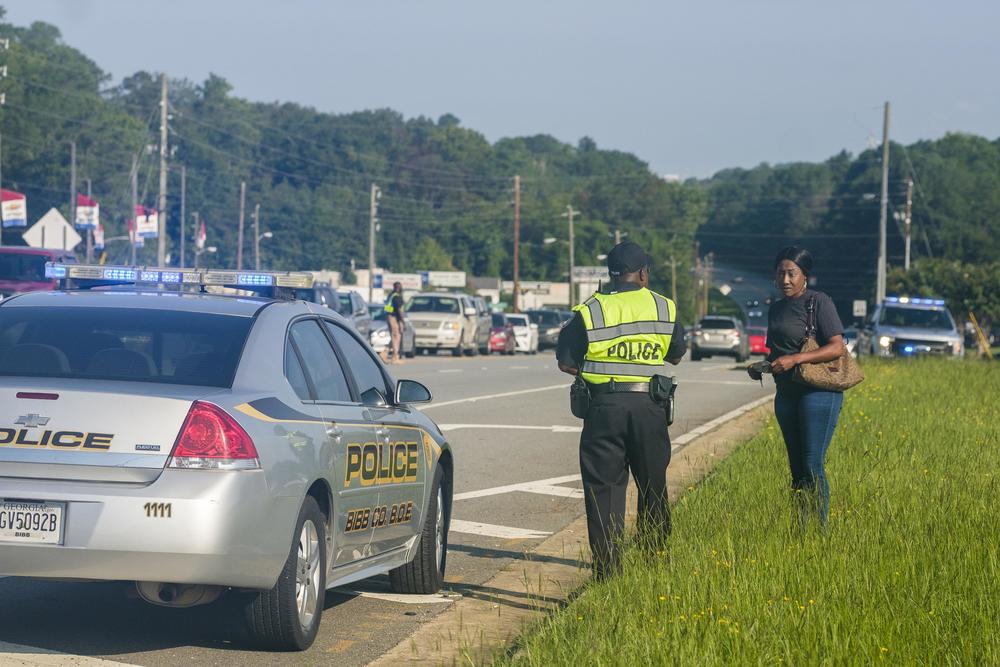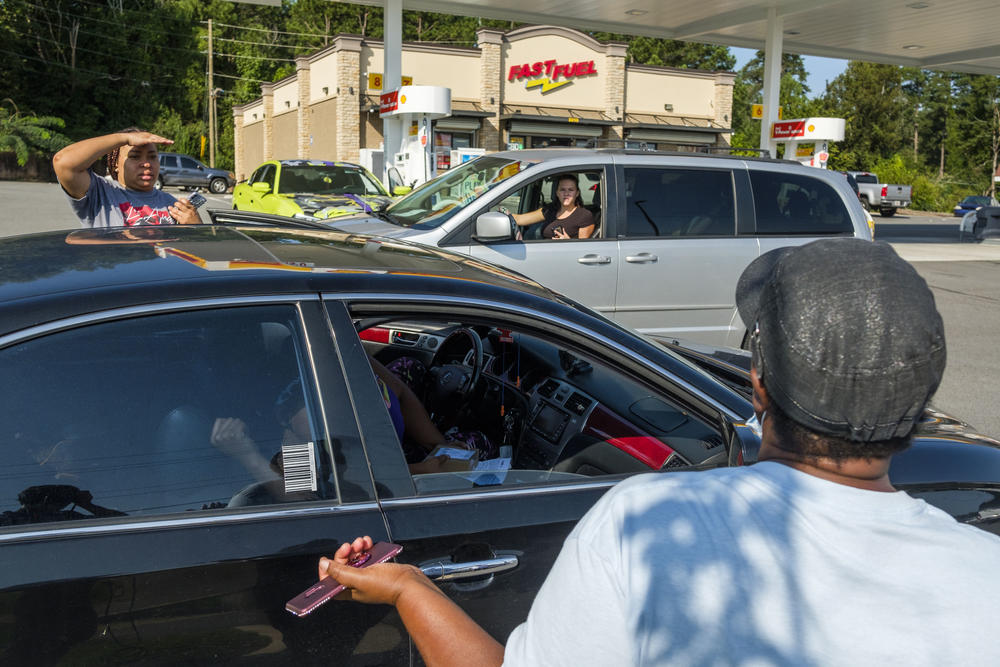
Section Branding
Header Content
Before Virtual School, The Struggle To Go Online
Primary Content
A few weeks before the start of school in Macon, Tayesha Banks came to Heritage Elementary School to pick up a laptop for her child.
Because of community spread of the coronavirus, the Bibb County School District would start the year fully online. That meant the district had to distribute 13,000 laptops to parents and caregivers like Banks.
All that was left for Banks was nailing down internet service. A teacher showed her the $10-a-month deal from the local internet service provider, Cox Communications. Banks had already seen that and knew there was a catch.
“For parents who, like, may have had Cox before and tried to get on it? They’re not going to allow them to do that,” Banks told the teacher.
The program wasn’t open to people who had ever been customers in the past. So Banks was left looking for other options.
“Well, I’m a parent. We make things work,” she said.
The coronavirus pandemic pushed many school districts – not just in Georgia but across the country – fully online this year. But a new report from the National Urban League and others points out that in the United States, roughly 17 million students, mostly students of color, don’t have adequate access to internet to get their work done.
And so the task now for educators – but perhaps even more so for caregivers – is keeping students connected until it’s safe to go back to school again.

When Bibb County Schools went online at the start of the pandemic in March, the district quickly lost contact with about 14% of its student body – about 3,000 students. The district doesn't want that happening again.
So the district had been counting on CARES act money to pay for laptops to get students online. When the coronavirus recession forced draconian budget cuts at the state level, Bibb Schools had to shift CARES money into patching holes in the general budget.
The result is a mix of new machines for some students and older machines borrowed from other schools for others.
In addition to the laptops, the students were sent home with traditional textbooks. The books will complement the online instruction, which the district says will follow the “flipped classroom” model.
“We're sending them videos, lessons and things so they'll watch those ahead of time and learn the information and kind of front load,” said Heritage Elementary School teacher Ashley Woods.
Woods said teachers will be online to offer help after students take the first step in learning new material themselves.
“They're taking more responsibility,” Woods said. “Students are taking more responsibility for learning the information.”
It will be up to parents and caregivers to make sure students are cracking open the books, virtual or otherwise. It’s a part of the massive shift in who is expected to shoulder the work of education in the wake of the pandemic. And Bibb school leaders agree, this is a tall order.
Because first, one needs an internet connection. Unlike some rural areas, internet access in cities like Macon isn’t an infrastructure problem as much as a problem of stretched personal budgets.
To help, Bibb Schools had 1,500 cellular broadband WiFi hotspots, provided by a grant, to give families. This was over a week after the laptops were in hand.

Demand for the hotspots was high. Half an hour into the nine-hour distribution day, the traffic snarled for a half mile in either direction with people trying to get into the school office parking lot.
“We are full to capacity! Come back and check a few hours later,” a district police officer told parents.
Across the street in a gas station parking lot, a small group of women who had been turned away vented their frustration. One woman asked, “What happens if I come back at 5:30 p.m. and all the hotspots are gone?“
What do you do?
Angel Wilson decided to wait.
“Got to have it. Got to have the hotspot,” Wilson said.
“My daughter, she’ll have to be going to work with me, and I don’t have WiFi everywhere I go to work, so she’s going to have to have the hotspot,” Wilson continued. “So I have to wait.”
By the end of the day, the district was left with 480 hotspots. Parents were told to talk to their school if they couldn’t fight the traffic but still needed a device.

Bibb Schools Superintendent Curtis Jones is aware of the internet gap. He’s trying to secure more cellular WiFi hotspots.
“In fact, we've determined that we probably needed about 13,000 just to make sure we can cover anybody and everybody,” Jones said.
The district doesn’t have the money to do that on its own. Jones is hoping for help from local non-profits, but it seems unclear that any of the big local organizations have a plan for that.
But the district has 25 WiFi equipped school buses to deploy in neighborhoods that need them. The networks are open and the buses will be in place from 7:30 a.m. to 4:30 p.m. daily.
On the Bibb County Commission, there has been a little talk about setting aside money to see the district through this patch until students can go to school face-to-face again. In some of those conversations it has been asked if it’s fair to extend county-subsidized internet to public school students but not to the students of the many local private schools.
It seems inevitable now that school is in session, there will still be some students who do not log on. For them, Dr. Jones said, there will be housecalls.
“We now have protection. We know how to put a mask on. We can know how to go knock on the door. And we'll go from there,” Jones said.
It’s all what Jones calls a new frontier, opened up to schools courtesy of the pandemic.


